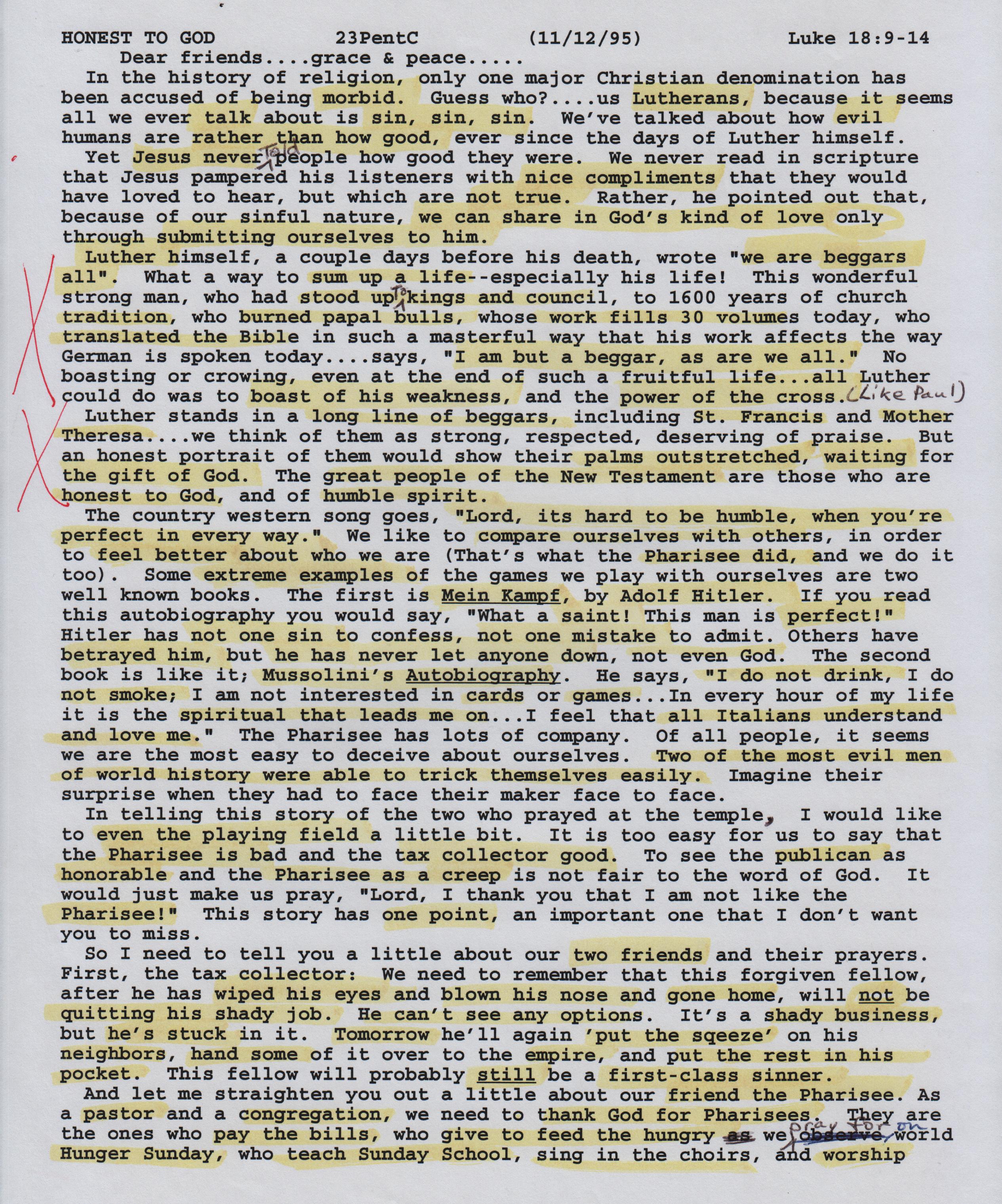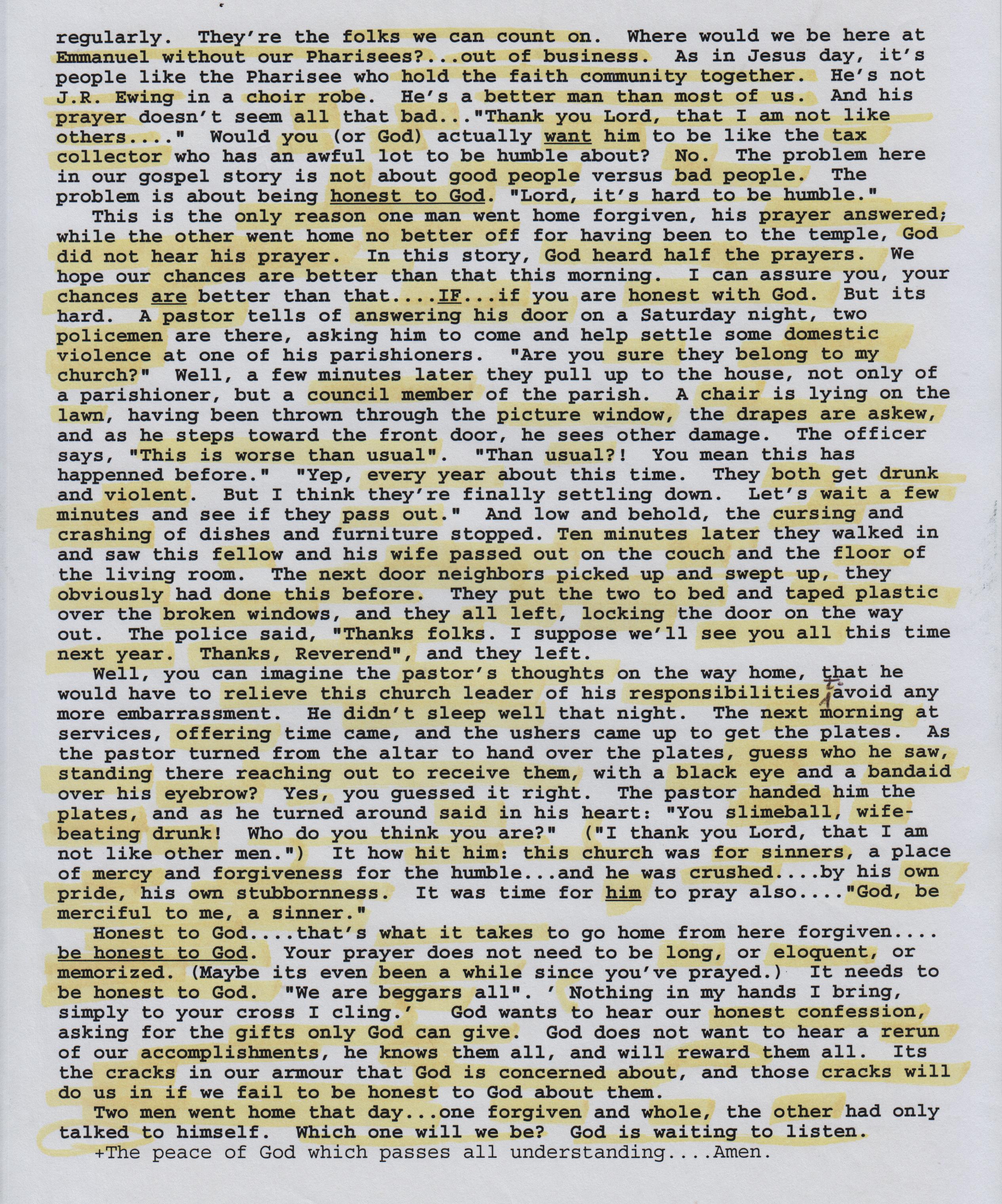This is a sermon that was printed and highlighted, and preached in 1995. There are red X marks next to two paragraphs in this sermon, so it is possible that those paragraphs were ommitted from the sermon when it was preached. There are also a few handwritten corrections. It was preached at Emmanuel Lutheran Church in Seymour, WI, as the church is mentioned by name in the sermon.
I found the old WordPerfect file on a 3.5 inch disk, and was able to open it up in LibreOffice, so I have posted the sermon text below the scanned images. The Gospel text for this sermon is Luke 18: 9-14. The sermon lists “23 Pentecost” as the lectionary, but the Gospel text from Luke is now a part of the 20th Sunday after Pentecost in Year C of the Revised Common Lectionary.
The sermon references the song It’s Hard to Be Humble by Mac Davis (who performed the song on The Muppet Show). That song has become a standard of the UW Badgers Marching Band. It also references Adolf Hitler’s Mein Kampf and Benito Mussolini’s My Autobiography as examples of the type of boasting that occurs in the prayers of the Pharisee. There’s also a reference to JR Ewing from the TV show Dallas.
HONEST TO GOD 23PentC (11/12/95) Luke 18:9-14


HONEST TO GOD 23PentC (11/12/95) Luke 18:9-14 Dear friends….grace & peace…..
In the history of religion, only one major Christian denomination has been accused of being morbid. Guess who?….us Lutherans, because it seems all we ever talk about is sin, sin, sin. We’ve talked about how evil humans are rather than how good, ever since the days of Luther himself.
Yet Jesus never people how good they were. We never read in scripture that Jesus pampered his listeners with nice compliments that they would have loved to hear, but which are not true. Rather, he pointed out that, because of our sinful nature, we can share in God’s kind of love only through submitting ourselves to him.
Luther himself, a couple days before his death, wrote “we are beggars all”. What a way to sum up a life–especially his life! This wonderful strong man, who had stood up kings and council, to 1600 years of church tradition, who burned papal bulls, whose work fills 30 volumes today, who translated the Bible in such a masterful way that his work affects the way German is spoken today….says, “I am but a beggar, as are we all.” No boasting or crowing, even at the end of such a fruitful life…all Luther could do was to boast of his weakness, and the power of the cross.
Luther stands in a long line of beggars, including St. Francis and Mother Theresa….we think of them as strong, respected, deserving of praise. But an honest portrait of them would show their palms outstretched, waiting for the gift of God. The great people of the New Testament are those who are honest to God, and of humble spirit.
The country western song goes, “Lord, its hard to be humble, when you’re perfect in every way.” We like to compare ourselves with others, in order to feel better about who we are (That’s what the Pharisee did, and we do it too). Some extreme examples of the games we play with ourselves are two well known books. The first is Mein Kampf, by Adolf Hitler. If you read this autobiography you would say, “What a saint! This man is perfect!” Hitler has not one sin to confess, not one mistake to admit. Others have betrayed him, but he has never let anyone down, not even God. The second book is like it; Mussolini’s Autobiography. He says, “I do not drink, I do not smoke; I am not interested in cards or games…In every hour of my life it is the spiritual that leads me on…I feel that all Italians understand and love me.” The Pharisee has lots of company. Of all people, it seems we are the most easy to deceive about ourselves. Two of the most evil men of world history were able to trick themselves easily. Imagine their surprise when they had to face their maker face to face.
In telling this story of the two who prayed at the temple. I would like to even the playing field a little bit. It is too easy for us to say that the Pharisee is bad and the tax collector good. To see the publican as honorable and the Pharisee as a creep is not fair to the word of God. It would just make us pray, “Lord, I thank you that I am not like the Pharisee!” This story has one point, an important one that I don’t want you to miss.
So I need to tell you a little about our two friends and their prayers. First, the tax collector: We need to remember that this forgiven fellow, after he has wiped his eyes and blown his nose and gone home, will not be quitting his shady job. He can’t see any options. It’s a shady business, but he’s stuck in it. Tomorrow he’ll again ‘put the sqeeze’ on his neighbors, hand some of it over to the empire, and put the rest in his pocket. This fellow will probably still be a first-class sinner.
And let me straighten you out a little about our friend the Pharisee. As a pastor and a congregation, we need to thank God for Pharisees. They are the ones who pay the bills, who give to feed the hungry as we observe world Hunger Sunday, who teach Sunday School, sing in the choirs, and worship regularly. They’re the folks we can count on. Where would we be here at Emmanuel without our Pharisees?…out of business. As in Jesus day, it’s people like the Pharisee who hold the faith community together. He’s not J.R. Ewing in a choir robe. He’s a better man than most of us. And his prayer doesn’t seem all that bad…“Thank you Lord, that I am not like others….” Would you (or God) actually want him to be like the tax collector who has an awful lot to be humble about? No. The problem here in our gospel story is not about good people versus bad people. The problem is about being honest to God. “Lord, it’s hard to be humble.”
This is the only reason one man went home forgiven, his prayer answered; while the other went home no better off for having been to the temple, God did not hear his prayer. In this story, God heard half the prayers. We hope our chances are better than that this morning. I can assure you, your chances are better than that….IF…if you are honest with God. But its hard. A pastor tells of answering his door on a Saturday night, two policemen are there, asking him to come and help settle some domestic violence at one of his parishioners. “Are you sure they belong to my church?” Well, a few minutes later they pull up to the house, not only of a parishioner, but a council member of the parish. A chair is lying on the lawn, having been thrown through the picture window, the drapes are askew, and as he steps toward the front door, he sees other damage. The officer says, “This is worse than usual”. “Than usual?! You mean this has happened before.” “Yep, every year about this time. They both get drunk and violent. But I think they’re finally settling down. Let’s wait a few minutes and see if they pass out.” And low and behold, the cursing and crashing of dishes and furniture stopped. Ten minutes later they walked in and saw this fellow and his wife passed out on the couch and the floor of the living room. The next door neighbors picked up and swept up, they obviously had done this before. They put the two to bed and taped plastic over the broken windows, and they all left, locking the door on the way out. The police said, “Thanks folks. I suppose we’ll see you all this time next year. Thanks, Reverend”, and they left.
Well, you can imagine the pastor’s thoughts on the way home, that he would have to relieve this church leader of his responsibilities avoid any more embarrassment. He didn’t sleep well that night. The next morning at services, offering time came, and the ushers came up to get the plates. As the pastor turned from the altar to hand over the plates, guess who he saw, standing there reaching out to receive them, with a black eye and a bandaid over his eyebrow? Yes, you guessed it right. The pastor handed him the plates, and as he turned around said in his heart: “You slimeball, wife-beating drunk! Who do you think you are?” (“I thank you Lord, that I am not like other men.”) It how hit him: this church was for sinners, a place of mercy and forgiveness for the humble…and he was crushed….by his own pride, his own stubbornness. It was time for him to pray also….“God, be merciful to me, a sinner.”
Honest to God….that’s what it takes to go home from here forgiven…. be honest to God. Your prayer does not need to be long, or eloquent, or memorized. (Maybe its even been a while since you’ve prayed.) It needs to be honest to God. “We are beggars all”. ’ Nothing in my hands I bring, simply to your cross I cling.’ God wants to hear our honest confession, asking for the gifts only God can give. God does not want to hear a rerun of our accomplishments, he knows them all, and will reward them all. Its the cracks in our armour that God is concerned about, and those cracks will do us in if we fail to be honest to God about them.
Two men went home that day…one forgiven and whole, the other had only talked to himself. Which one will we be? God is waiting to listen.
+The peace of God which passes all understanding….Amen.